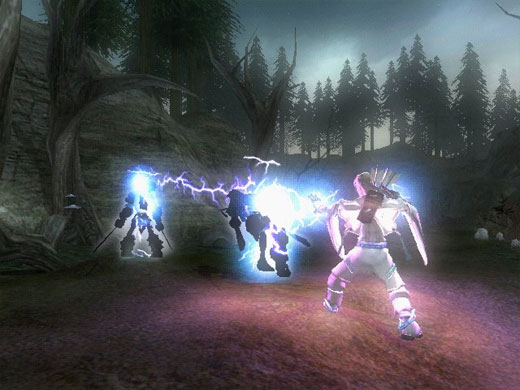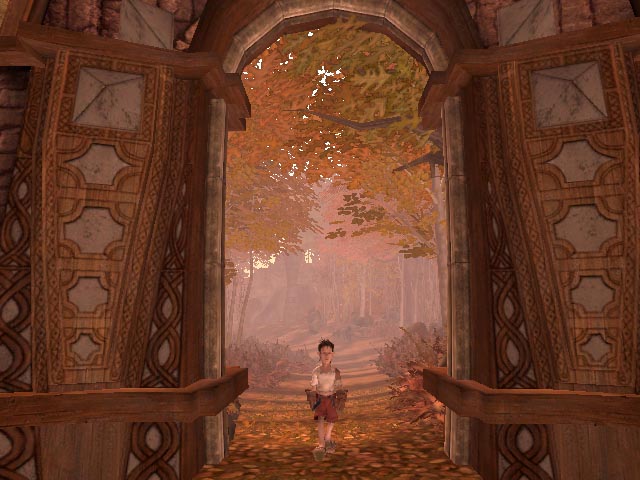|
|

|
BATTLE SYSTEM
|

|
INTERACTION
|

|
ORIGINALITY
|

|
STORY
|

|
MUSIC & SOUND
|

|
VISUALS
|

|
CHALLENGE
|
pathetically easy |
COMPLETION TIME
|
10 to 20 hours
|
|
OVERALL
3.5/5
|
Rating definitions
|
|
|
"Chicken chasing, that makes you a true hero." Such is the derisive contempt leveled at a yet unblooded hero by the townsfolk. By the end of the game, these same townsfolk will be referring to the hero as "worshipful avatar" - a far cry from the early days of chicken chasing.
But which appellation is most appropriate for Fable itself? Peter Molyneux's brainchild promised a revolution for the RPG genre and spent three years in development to craft the world of Albion, but many ideas were left on the cutting room floor. The choice: is the end result worthy of being called worshipful by the teeming masses of RPGamers everywhere? Or does Fable fall short and into the realm of chicken chasing, leaving its lofty promises behind as a fable told to children?
Fable's story revolves around a single playable hero. The story itself is the game's major weak point as it would be very easy to spoil the entire thing in just a few short sentences; depth and originality are quite lacking. Much of the story falls under a simple revenge motif but is never adequately fleshed out.
The ultimate bad guy is introduced very late in the story, and we never find out his motivation beyond the standard world domination theme. Other major characters appear at random to perform their little spotlight and then disappear for large gaps of time, leaving the hero to discover the plotline for himself. Large gaps of time is also somewhat misleading since the main story quests only occupy around ten hours of gameplay. Side quests can add five to ten more, but the overall scripted portions of Fable seem unnaturally short, especially given the depth of the incredible sandbox environment.
 Join the Dark Side!
Join the Dark Side!
|
|
One of the main selling points for Fable is the ability to customize the hero in a myriad of ways. Gameplay reflects this customization by rewarding experience for skills that are used; the hero earns four types of experience: strength, skill, will, and general. The first three are gained by performing specific actions: smack a troll with an axe to get strength, decapitate a bandit with an arrow to get skill, or fry hordes of Hobbes with lightning to gain will. Once thoroughly dead, enemies also drop general experience points which can be used for any of the three categories.
But the experience spending is somewhat skewed. The strength and skill categories each have three branches to develop, but the will category has sixteen since experience must be spent to purchase spells. These skills could have been much deeper; do not expect the skillset customizations available in a game like Diablo II.
The hero's appearance will also be affected by a number of factors. If the hero is struck in combat, he might develop scars. He can also go to a barber or tattooist in an effort to either pretty himself for wooing the ladies or become a fearsome visage that strikes terror into the hearts of villagers. The hero does age during the game, but this introduces complications in the storyline since no one else really appears to age much. Age is purely cosmetic since a 65 year old granther swings a pickaxe with as much ease as a teenager.
Combat is fast and furious in a completely real-time environment. The controller setup offers good customization so it is usually easy to have useful skills assigned to shortcuts. It is possible to merely hack and slash one's way through the game, but experienced players can be challenged to raise their combat multiplier as high as possible. The multiplier is raised for successful hits in a row, but is drastically dropped when the hero is hurt; this multiplier affects the amount of experience given by enemies so there is incentive to get it as high as possible.
Gamers should note that Fable is not a difficult game. Health restoratives are dropped liberally, and if the hero has a resurrection phial he is automatically resurrected on the spot. With the sole exception of a few timed sequences, the hero is usually way overpowered for his missions.
Experienced players can also make boasts about the quests they undertake; these boasts are aimed at making a quest harder by placing restrictions on the hero while granting extra rewards upon completion. The AI also leaves something to be desired as it is entirely possible to save a group of guardsmen from certain death only to have them join in with you by shooting arrows over your shoulder - and occasionally into your shoulder.
 This little boy grew up
to rule the world.
This little boy grew up
to rule the world. |
|
Perhaps the best aspect of Fable is its sandbox environment. Players are rarely required to move the story forward at any given point and can spend hours wandering around doing, well, stuff. There are women (and men) to flirt with. Marriages to be made. Fist Fighter Gangs to be taken down. Drinks to be drunk. Sex to be sought. Vandalism to be wrought. Houses and shops to be bought. Even trying to give a skimpy overview of every single choice would double the size of this review; gamers who enjoy playing around with their environments will have a perfect match in Fable.
Much ado is also made of the morality system. The hero gains good or evil points depending on his choices. Save a merchant from bandits and get some good points. Join with the bandits and kill the merchant to become a little more evil. The character's good/evil points will also end up reflecting on the character's appearance: a heavenly halo or hellish horns might be the end result of concentrated actions. Most of the choices within the game are relatively straightforward; moral ambiguity is nonexistent.
"For every choice, a consequence." So reads the cover of Fable. This is only somewhat true. While good/evil points are garnered for nearly every action, they do not affect the story at all. Players will never be limited by their previous choices; this gives an open-ended freedom in choices but neuters the consequences beyond how NPCs will react to the hero.
On a visual level, Fable is incredibly detailed. It is obvious that much care went into presenting an environment that seems to be full of life and history. Some main story sequences are told through the usage of gorgeous storyboards in an epic style. Aurally, the game presents a pleasant atmosphere that matches the environment well. Most of the voice acting is good, although the Guildmaster will speak into the hero's mind in a style that is disturbingly reminiscent of Obi-Wan.
In terms of replayability, Fable is a mixed bag. The short story will never be any different, but the execution of the gameplay offers a vast array of unique options which will appeal to some gamers. Fable does come recommended for all RPGamers; it might not be the redefinition of an RPG experience, but it does offer a solid gaming experience.
Review Archives
|









